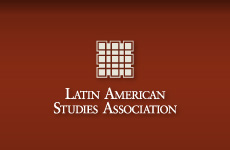News & Notes
Reflecting back on the 2019 LASA Nuestra América: Justice and Inclusion panel
Nov 25, 2020

[image credit: Jessamyn West, 2019]
This post look back on the 2019 Libraries, Archives, and Research (now Archives, Libraries and Digital Scholarship) Section panel on social justice
Latin American Studies librarians and archivists play an important role in advancing social justice as stewards of collection, information literacy instructors, and providers of diverse information services. The 2019 Libraries, Archives and Research Section LASA panel highlighted examples of social justice projects completed by academic libraries and archives. Collectively, the panelists illustrated the range of social justice work undertaken by information professionals to empower diverse communities, support social and human rights, as well as advance decolonial information practices. Learn more about each of the 2019 presenter and their projects below:
Historical memory and justice in Guatemala: The Grupo de Apoyo Mutuo Digital Archive | Alex Galarza, Haveford College
Dr. Alex Glarza, Council on Library and Information Resources (CLIR) postdoctoral fellow at Haveford College, presented on the ethical, security, and privacy consideration of developing a digitization workflow and public web platform for the Grupo de Apoyo Mutuo (GAM) Digital Archives. As an international human rights archive, the Grupo de Apoyo Mutuo (GAM) Digital Archive digitizes, preserves, and provides access to over 3,700 case files of disappearances tied to Guatemala's armed internal conflict (1960-1996). This archive provides access to sensitive materials including text, visual, and audio-materials related to los desaparecidos [the disappeared], and other human rights violations of the Guatemala's civil war to family members, human rights organizations, and researchers. Explore the archive and learn more about this project here.
Alternative Methodologies to Promote Inclusion and Access to Human Rights Information in Rural Guatemala| Emily Willard, Ph.D Candidate, University of Washington
Doctoral student Emily Willard presentation focused on access to information as a human right as well as the role of the post-custodial archive to deconstruct colonial relationships and promote inclusion of marginalized populations in archival access and analysis. Her case study drew on professional experience working with in the National Security Archive as well as her doctoral research on women's experience of conflict, Indigenous politics, and transitional justice in Guatemala. Emily shared various innovative methods for engaging marginalized communities directly with digital collections using both traditional and non-traditional approaches that allowed key actors from these communities to shed light and offer unique perspectives on existing records. Emily stressed the ethical obligations archives have in assisting marginalized communities to overcome technological, literacy, and other obstacles in order to maximize access to digital archival records and collections. Her work explored collaborative and participatory research methods that assisted to connect communities to the larger debates of historical memory and justice initiatives in post-conflict societies.
Decolonization in practice: Creating the first online edition of the Popul Vuh |Pamela Espinosa de los Monteros, The Ohio State University
Assistant Professor and Latin American, Iberian, and Latino Studies Librarian Pamela Espinosa de los Monteros at The Ohio State, presented on the results of a ten-year multi-institutional initiative to create the first digital edition of the Popol Vuh. The online surogate was developed to digitally reptriate the Popol Vuh back to its Mesoamerican Amerindian community and to support new research on the Popol Vuh that went beyond existing and more accessible occidental published translations and interpretations. The presentation focused on highlighting the unique ethical, legal, intellectual and technological consideration of stewarding an indigenous knowledge work online, including the limitation of digital repatriation of cultural artifacts. The case study also explored the potential of digital humanities to remediate existing knowledg equity gaps for indigenous knowledge resources, while also highlighting the difficulty of maintaining digital projects due to staff rotation, changing technology, and apathy towards unknown cultural works.
Explore the 2007 online edition of the Popol Vuh and read more about this project here.
Seeking "Information Justice" in Latin American Studies: Strategies from a Teaching Librarianv | Kathy Swart, Pierce College
Professor and Instructional Librarian Kathy Swart of Pierce College presentation examined how open curriculum/assignments can contribute to advancing "information justice". Specifically, Kathy discussed how open pedagogy can remediate historical negationism found in traditional resources such as college textbooks referring to Brazil's 1964 coup. Traditional sources may present a U.S. centric or western perspective of Latin American historical accounts that is at best limited and at worst grossly inaccurate or problematic. OERs and other library-based resources offer instructors and students with an opportunity to include global perspectives that are inclusive, authentic, engaging, and authoritative. The use of open sources can supplement gaps in existing curriculum as well as allow students to critically evaluate different information resources including uncovering hidden biases behind dominant "single" narratives. Through her presentation, Kathy demonstrated how to use open pedagogy activities and instructional techniques that invited students to contribute positively to a more just information landscape. Learn more about this instructional curriculum here.
